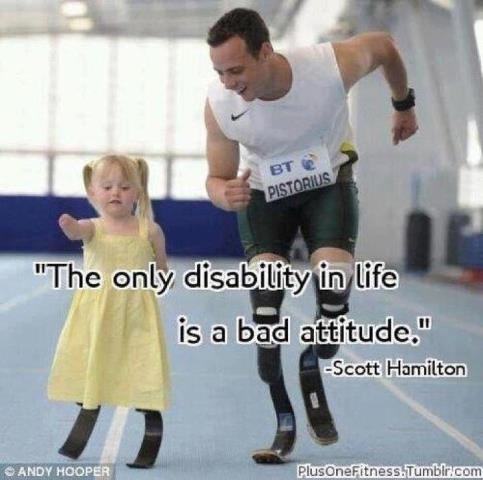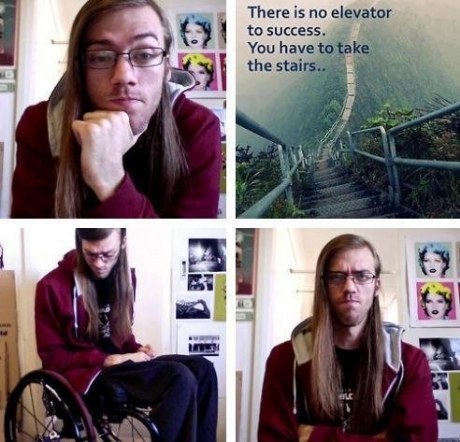Even if you don't care about football, you can't help but hear about the Super Bowl...or at least the commercials.

This year, there were two commercials that featured people with disabilities. Long story short, one was okay and one was really really not.
The first commercial, titled "How Great I Am" aired during the first quarter and showed actress, model, and world-class paralympic snowboarder Amy Purdy driving a Toyota from place to place while boarding, modeling, and salsa dancing.
The second, titled "Braylon O'Neill" aired just before halftime. This one centered around six-year-old Braylon and his family, and showed how Microsoft's technology has allowed him to play sports.
Why was one commercial fine by me and the other highly problematic? It really comes down to what's known as inspiration porn.
Inspiration porn is those pictures you see featuring a person with a disability doing something completely ordinary – maybe running, playing, or going to work – and a caption something along the lines of "no excuses." It's the video of a woman communicating with her deaf child through sign language accompanied by a message reminding us "if they can do it, so can you." It's commercials like Microsoft's.

These images and videos do not represent disabled people in a positive light. They barely even treat us as human.

Inspiration porn uses disabled people as a prop to make able-bodied folks feel better about their lives. Why do you need to remind yourself that men and women without legs exercise to boost your own workouts? A lot of people exercise. If you are inspired by a person for their commitment to a regimen, that's one thing – the line is when the inspiration stems from the fact that they are committed "despite" their condition.

Contrary to popular belief and what the media tends to show, disabled people do not all live terrible, depressing lives. Some of us have jobs or go to school. Some of us have hobbies, friends, and families. Maybe we're amazing or inspiring because we made the Dean's List in college, or because we landed a major promotion. Anyone who accomplishes these things is worthy of praise – but not despite a disability.
In addition to turning us into props, inspiration porn drives a wedge through the disabled community. Many people with disabilities cannot do the things shown in those popular pictures of exercising amputees. They're not "just not trying hard enough" – they actually can't do it.

We live in a society where the worth of an individual is determined by what they can do – how hard they work, what they can give back to their communities, and what they produce. Inspiration porn glorifies disabled people who either have access to doctors, technology, and support systems who help them along the way, or those with curable or manageable conditions. It ignores those who either don't have the resources to recover or work, or whose conditions are rare, unmanageable, or incurable.
Back to the Super Bowl...
Toyota's Super Bowl commercial showed Amy Purdy driving around town, living her life, just like anyone else would. She fell down on her snowboard, she tried dancing, she snowboarded some more, she modeled in a photoshoot, she performed that dance in front of an audience. She looked awesome and confident doing it all. The ad showed her prosthetics, but the whole point of the ad was that this car can help you get to all your activities safely and efficiently. Had the ad been shot frame-for-frame with a different woman – an able-bodied woman – the message would be the same and the commercial would need no adjustments.
In Microsoft's commercial, on the other hand, the focus was all on the disability. There was footage of Braylon as a toddler, getting fitted for prostheses, playing sports, and visiting doctor's offices. The background dialogue talks about "showing courage in the face of reality." All along the way, people are clapping for Braylon as he plays baseball and runs a race – pretty basic things for a small child.
Of course, I'm not trying to downplay the positive effect Microsoft's technology has had on Braylon's life, or that of his family. I know firsthand the frustrations of dealing with a broken healthcare system and a lack of solutions to a chronic condition. I'm sure his parents are immensely grateful to Microsoft for helping their son, for funding and creating the technology that would allow him to play with the other boys. But it is damaging to tell the story in this way.
The infantilization of disabled people is a huge problem – one that goes beyond people in wheelchairs being patted on the head and called "cute" long into adulthood. It leads to people taking away autonomy – physically moving people in wheelchairs "out of the way," taking away assistive devices such as canes, and making medical and personal decisions for those who are deemed less capable. What is even scarier is that this infantilization is only multiplied when inspiration porn involves disabled children or babies.

Oh, but of course it gets worse. Microsoft had a second Super Bowl spot; this one featured a woman named Estella Pyfrom, who cashed out her retirement savings and used the money to bring computers to children in underserved areas.
Now this is a woman with an inspiring story. She did something extraordinary, something not everyone would choose to do. However, Microsoft's press release on the commercials referred to both Pyfrom and Braylon as "heroic and inspiring individuals." Is there really a comparison here? One is a woman who gave up her life savings to help others, the other is a young boy who was born without legs. One made a choice to be a hero for those in need, the other chose nothing – his life is not like others, but that does not make him a hero, nor does it make him "inspiring."
The main argument I hear in defense of inspiration porn is that these people are making a choice, and I can't argue with that. They are making a choice to live. But when people glorify that choice, it is casting shame on those that don't – or can't – make that same choice. Many people with disabilities don't have access to the same resources that Braylon's family did. Many have conditions that are incurable. What about them?
Over 110 million people watched Super Bowl 2015 on Sunday, February 1st. This is a highly visible event – arguably the most visible in the country. That means that hundreds of millions of people saw – and reacted to – Microsoft's commercial:
Cut to: Katy Perry hastily cutting her legs off backstage
Lots of Super Bowl commercials tugging at the heart strings. Microsoft and Braylon. Wow.
Hats off to this SUPER little man, Braylon O'Neill. Just remember this when you think you might be having a bad... http://t.co/9j1urLy5C2
Most of the responses mentioned how the ad "tugged at heart strings" and made them cry, but few people seemed to mention any of Microsoft's products. And the joke about Katy Perry "cutting her legs off" before her halftime show in order to appeal to the audience was obviously crass and unnecessary.
So why does this matter? It's clear that inspiration porn is immensely damaging. Disabled people are treated as less than human every day – they are paid only 22 cents per hour, murdered by family members, and ignored by technology. When the media portrays us in a way that causes an audience to pity us, it only holds back our progress toward gaining respect and safety.
You can watch both commercials here:



